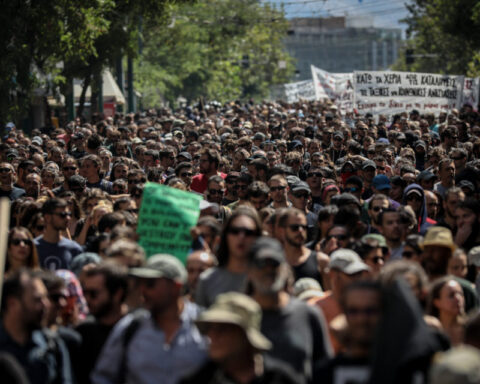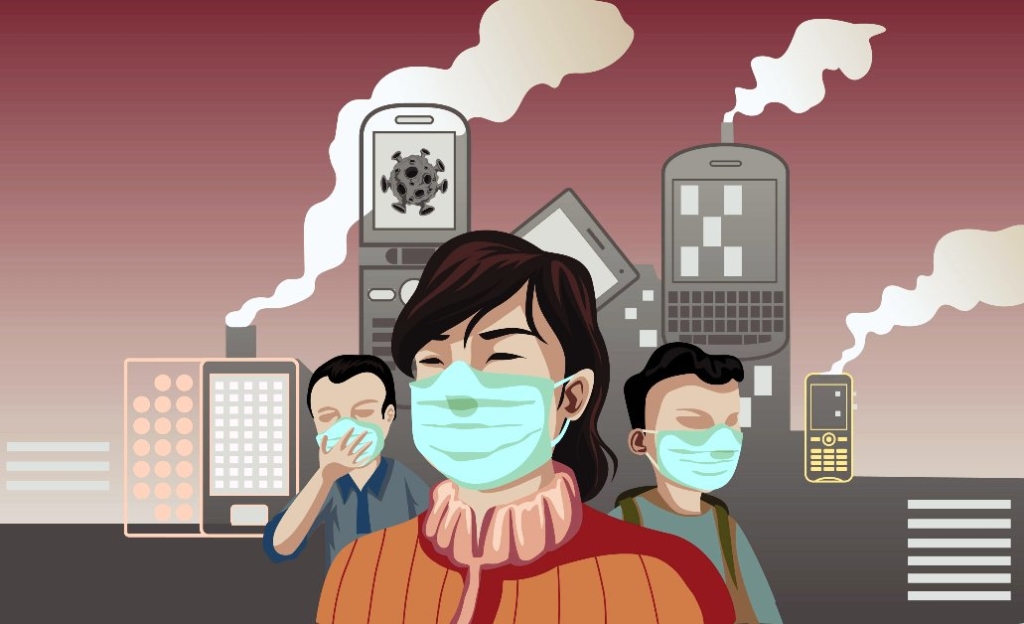Translation: Rodanthe Scourtelli / Void Network
Neither with the State, nor with the Idiots: The Social Project of Reclaiming Public Sector.
(Thoughts triggered by the coronavirus crisis)
The greek word “ιδιώτης” [private person, as opposed to one taking part in public affairs][1] translates into English as idiot. And if you are wondering how the mutation in the meaning of this word came about, you would be surprised to learn that the early meaning of the word in the greek language was the same as in English. If we refer to Aristotle’s “Politics”, not only do we find the definition of the human being as a “social and political animal”, since man can only be perceived within society and for society (ἐκ τούτων οὖν φανερὸν ὅτι τῶν φύσει ἡ πόλις ἐστί), but we will also discover this not-so-flattering word to describe non-participant citizens, those who do not demonstrate social responsibility and political awareness, private citizens, all those who chose to place themselves outside of society. So, “άπολις”, (the man without a city-state or against it), if he is not a being superior to man, (in other words if he is not God), he is undoubtedly inferior to man; he is a “φαῦλος”, a wretched man.[2]
After the Great Depression, the worldwide economic crisis that took place in the 1930s, John Maynard Keynes realised a major problem in the functioning of capitalism, which half a century earlier Marx had already predicted. The fierce competition amongst individuals in all spheres of production, the individual’s independent effort to prevail against his competitors leads to a position of exclusive dominance, that is, to the creation of a monopoly. This razing to the ground of the many for the benefit of the one has caused overwhelming social consequences, since, in addition to dismantling infrastructure (factories and production units), it triggers mass unemployment and decline in purchasing power. Thus, the overall economic outcome inflicts the independent capital, which though it has prevailed as the dominant monopoly, the extensive crisis – caused by the overwhelming social consequences – now threatens it too. Keynes pinpointed that the competitive nature of individual capitalists, their very own “idiocy” would sooner or later lead to the complete destruction of capitalism and – who knows – perhaps to a World Revolution. So, being an impenitent bourgeois, he stated boldly: Capitalism is too important to be left to capitalists.
To answer this problem, Keynes introduced the basic idea of the historical transformation of the role of the state. The state would no longer be just “the army and the police” to guard the capitalists, to protect private property from the revolutionary looting of the poor. It would be much more: the coordinator, the organiser and the supervisor in all areas of production; an omniscient super-capitalist, above other capitalists, set to ensure that the interest of the one capitalist (idiot) [ιδιώτη], would no longer be detrimental to the interests of the other capitalists (idiots) [ιδιώτες].
Keynes copied this idea, to a great extent, from the then-young Soviet experiment, having noticed that the state’s central production plan was a safeguard from the private capital’s short-sighted desire for demolition of the public infrastructures [to be replaced by private ones]. The nationalisation of strategic sectors of production and public infrastructure projects, such as the construction of roads, ports, railways, taxation and social benefits, in other words, all what we nowadays call Keynesian model – though commended by much of the working class – was historically proven to be the most intelligent strategy against the working class itself. After creating a state — a giant-sized collective capitalist — which not only financially rescues the large-scale enterprise capitalist [the individual, the “idiot”], but also when this individual fails in the ruthless competition with other “idiots” — utilising public funds that basically belong to us, the state undertakes to build and improve infrastructures that are essential for the private sector. In the next phase, when the crisis is over, the state hands over to its favourites in the private sector, those infrastructures that were built in the first place with public funds as public property. In other words, it implements blatant privatisations. After all, this repeated oscillation between privatisation and nationalisation that we have witnessed in the last century (the so-called large-scale rescue programs), which are naively perceived as political confrontation between social democrats and liberals, is nothing but the two sides of the same coin: a state acting like an overprotective father rescuing independent capitalists, the idiots [ιδιώτες] when they go bankrupt by buying or financing their business with aid programs, on the one side; and on the other, feeding them, with new, fully-equipped, profitable public infrastructures (call it privatisation) which are sold at a bargain price. Without this bi-functional nature of the state, the “idiots”[ιδιώτες] of the private sector would have vanished into History’s archives.
Considering all the above, nowadays, those who identify the social project of reclaiming the public sector (i.e. the sharing of common goods, infrastructures, which are under constant social control and horizontal [grassroots] management)with the state, have not fully grasped the very nature of the modern state as the largest enemy of the common good. So, the question that urgently needs to be asked is: why do idiots [ιδιώτες][3] still win?
To answer this question we ought to be extra vigilant. Independent capitalists are no more unintelligent than the rest of us. There is nothing innately inferior in their brainpower, just as there is nothing superior in the intelligence of others. Actually, their idiocy proves to be the chief characteristic of their strategy in the free-market game: anyone who makes no effort to crush their competitors, sooner or later will be eliminated. In other words, it is in the “nature of the game” to behave idiotically [i.e. individualistically]. Nevertheless, every single one of us — who lives in a free-market society, that is, in a society of consolidated competition — displays exactly the same stupidity, the same individualistic spirit, when we favour our personal (short-term) interest against the overall (long term) one. For, workers, who instead of being organised in their union become their boss’s “brownnose” and will be the losers in the end. Any union, which instead of being part of the collective struggle of the working class prioritises demands of its own trade or its own factory, will find itself at a loss. Moreover, the working class, in any country, which sees its interests in competition with the interests of the “foreign” workers, will also find itself at a loss. The ephemeral interest of the individuals, who once had come close to becoming the “undertakers of the capitalism”, condemns the suppressed to perpetual misery.
Marx noted that in the early capitalist communities of the Middle Ages, the first capitalists managed to develop and gradually prevail after centuries, because, in those difficult conditions, the short-term private interest was identified, paradoxically, with the collective long-term one. The small independent producers of the time, in order to be able to survive in the suffocating system of feudalism, had to think cooperatively, to build markets/bazaars together, to create shared infrastructures, to collaborate freely and on equal terms, to build ports for their ships, to build towns at strategic points on trade routes, to create institutions of collective self-governance, to print money and to build banks. So, in the midst of a hostile society, they built their own community step-by-step. They managed to identify the private interest with the public interest, the short-term interest with the long-term interest. This is the greatest achievement of the bourgeois class throughout its history. When it ceased to follow this reasoning, its decline commenced.
So, what must we do to overthrow the kingdom of idiots [i.e. the state], what must we do to shift to the power of communal sharing? All we have to do is learn from the history of idiots [ιδιώτες][4]; the social class we are set to overthrow. Let’s ask ourselves: how can we make today’s common interest be identical to the collective interest? What collective projects and ideas can transform daily rivalry into solidarity and mutual aid? What aesthetic images can compensate today’s ethics of rivalry that stand in the way of our ultimate goals?
The recent coronavirus crisis, when public health and healthcare staff emerged as a collective good — in stark contrast to the plans of the state and private sector — provides an opportunity for reflection. The whole situation is in contrast with the culture of the idiots [ιδιώτες][5]; it is clear that anyone who defends the power of private interests (as all states do today) puts at stake the lives of the entire community. It is an opportunity to seriously consider: why shouldn’t hospitals, pharmaceutical and health infrastructures be public goods (since we all pay for them); without (most) private capitalists (pharmaceutical-industry owners, private-clinic owners and other parasites) making a profit? Why not have more hospitals, better-equipped hospitals in small towns, more parks, squares, sport centres and other public facilities that we will all fund together instead of handing over their management to some “stupid” pimps who sell us nothing but hot air? Why don’t we manage as our own, through grassroots collective administration and decision- making, the sectors of health, education, food production, mass media, culture, schools and factories?
Let’s
put an end to this kingdom of idiots,
to this state that has lasted far too long, (we’re sick of it). Let’s take our
lives into our own hands, with confidence, with courage and awareness of our
real power.
[1] T.N.: Those who did not contribute to politics and the community were known as “Idiotes” (ΙΔΙΩΤΕΣ), originating from the word “Idios” (ΙΔΙΟΣ) which means the self. If you did not demonstrate social responsibility and political awareness you were considered apathetic, uneducated and ignorant. https://www.historydisclosure.com/what-does-idiot-mean/
[2] [See: Aristotle, Politics, 1253a1-9]
[3] T.N.: i.e. private capital
[4] T.N.: i.e. private capital
[5] ditto
________________________________________
written by Sotiris Lycourghiotis, MSc, PhD
Translation: Rodanthe Scourtelli / Void Network










